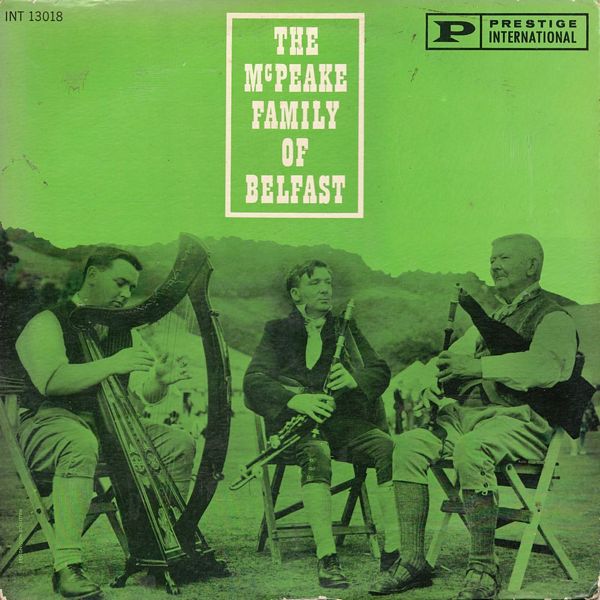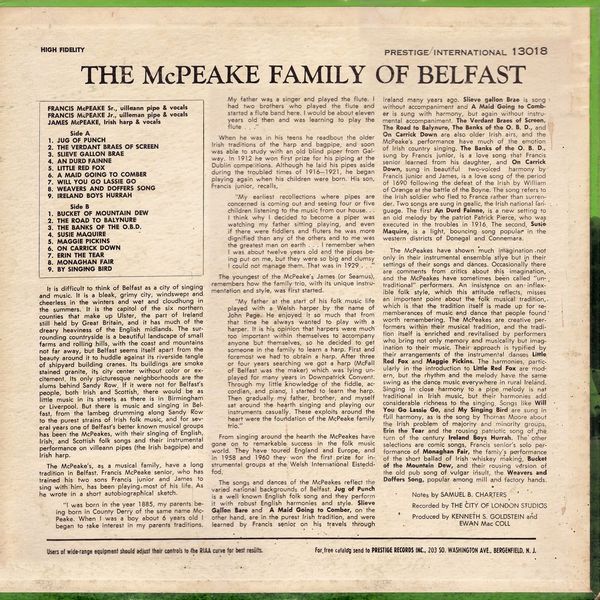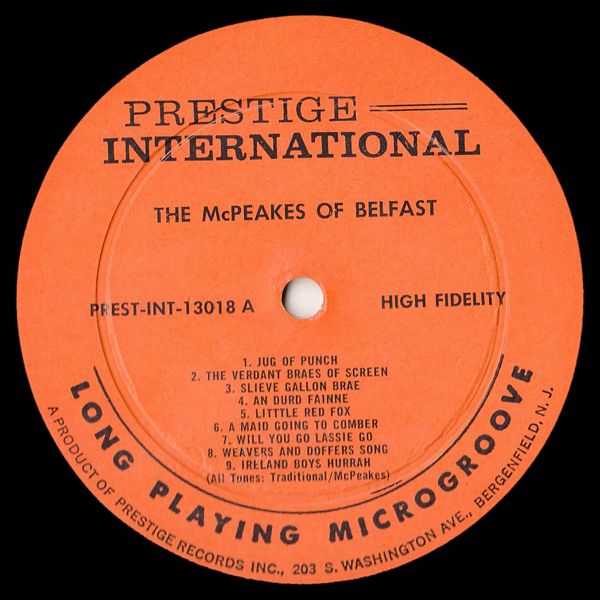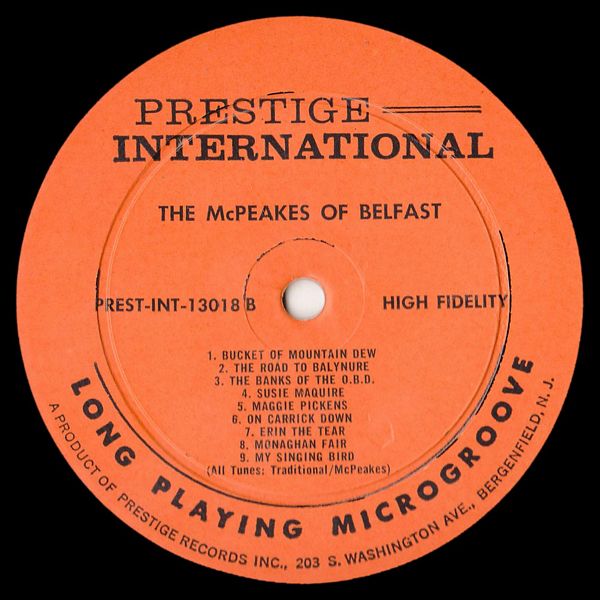
 |


 |
Sleeve Notes
It is difficult to think of Belfast as a city of singing and music. It is a bleak, grimy city, windswept and cheerless in the winters and wet and cloudhung in the summers. It is the capitol of the six northern counties that make up Ulster, the part of Ireland still held by Great Britain, and it has much of the dreary heaviness of the English midlands. The surrounding countryside is a beautiful landscape of small farms and rolling hills, with the coast and mountains not far away, but Belfast seems itself apart from the beauty around it to huddle against its riverside tangle of shipyard building cranes. Its buildings are smoke stained granite, its city center without color or excitement. Its only picturesque neighborhoods are the slums behind Sandy Row. If it were not for Belfast's people, both Irish and Scottish, there would be as little music in its streets as there is in Birmingham or Liverpool. But there is music and singing in Belfast, from the lambeg drumming along Sandy Row to the purest strains of Irish folk music, and for several years one of Belfast's better known musical groups has been the McPeakes, with their singing of English, Irish, and Scottish folk songs and their instrumental performance on uilleann pipes (the Irish bagpipe) and Irish harp.
The McPeake's, as a musical family, have a long tradition in Belfast. Francis McPeake senior, who has trained his two sons Francis junior and James to sing with him, has been playing most of his life. As he wrote in a short autobiographical sketch.
"I was born in the year 1885, my parents being born in County Derry of the same name McPeake. When I was a boy about 6 years old I began to take interest in my parents traditions. My father was a singer and played the flute. I had two brothers who played the flute and started a flute band here. I would be about eleven years old then and was learning to play the flute …"
When he was in his teens he read about the older Irish traditions of the harp and bagpipe, and soon was able to study with an old blind piper from Galway. In 1912 he won first prize for his piping at the Dublin competitions. Although he laid his pipes aside during the troubled times of 1916-1921, he began playing again when his children were born. His son, Francis junior, recalls,
"My earliest recollections where pipes are concerned is coming out and seeing four or five children listening to the music from our house …
I think why I decided to become a piper was watching my father sitting playing, and even if there were fiddlers and fluters he was more dignified than any of the others and to me was the greatest man on earth … I remember when I was about twelve years old and the pipes being put on me, but they were so big and clumsy I could not manage them. That was in 1929 …"
The youngest of the McPeake's James (or Seamus), remembers how the family trio, with its unique instrumentation and style, was first started.
"My father at the start of his folk music life played with a Welsh harper by the name of John Page. He enjoyed it so much that from that time he always wanted to play with a harper. It is his opinion that harpers were much too important within themselves to accompany anyone but themselves, so he decided to get someone in the family to learn a harp. First and foremost we had to obtain a harp. After three or four years searching we got a harp (McFall of Belfast was the maker) which was lying unplayed for many years in Downpatrick Convent. Through my little knowledge of the fiddle, accordion, and piano', I started to learn the harp. Then gradually my father, brother, and myself sat around the hearth singing and playing our instruments casually. These exploits around the heart were the foundation of the McPeake family trio."
From singing around the hearth the McPeakes have gone on to remarkable success in the folk music world. They have toured England and Europe, and in 1958 and 1960 they won the first prize for instrumental groups at the Welsh International Eisteddfod.
The songs and dances of the McPeakes reflect the varied national backgrounds of Belfast. Jug of Punch is a well known English folk song and they perform it with robust English harmonies and style. Slieve Gallon Brae and A Maid Going to Comber, on the other hand, are in the purest Irish tradition, and were learned by Francis senior on his travels through
Ireland many years ago. Slieve Gallon Brae is song without accompaniment and A Maid Going to Comber is sung with harmony, but again without instrumental accompaniment. The Verdant Braes of Screen, The Road to Balynure, The Banks of the O. B. D., and On Carrick Down are also older Irish airs, and the McPeake's performance have much of the emotion of Irish country singing. The Banks of the O. B. D., sung by Francis junior, is a love song that Francis senior learned from his daughter, and On Carrick Down, sung in beautiful two-voiced harmony by Francis junior and James, is a love song of the period of 1690 following the defeat of the Irish by William of Orange at the battle of the Boyne. The song refers to the Irish soldier who fled to France rather than surrender, Two songs are sung in Gaelic, the Irish national language. The first An Durd Fainne, is a new setting to an old melody by the patriot Patrick Pierce, who was executed in the troubles in 1916. The second, Susie Maguire, is a light, bouncing song popular in the western districts of Donegal and Connemara.
The McPeakes have shown much imagination not only in their instrumental ensemble style but in their settings of their songs and dances. Occasionally there are comments from critics about this imagination, and the McPeakes have sometimes been called "un-traditional" performers. An insistence on am inflexible folk style, which this attitude reflects, misses an important point about the folk musical tradition, which is that the tradition itself is made up for remembrances of music and dance that people found worth remembering. The McPeakes are creative performers within their musical tradition, and the tradition itself is enriched and revitalized by performers who bring not only memory and musicality but imagination to their music. Their approach is typified by their arrangements of the instrumental dances Little Red Fox and Maggie Pickins. The harmonies, particularly in the introduction to Little Red Fox are modern, but the rhythm and the melody have the same swing as the dance music everywhere in rural Ireland. Singing in close harmony to a pipe melody is not traditional in Irish music, but their harmonies add considerable richness to the singing. Songs like Will You Go Lassie Go, and My Singing Bird are sung in full harmony, as is the song by Thomas Moore about the Irish problem of majority and minority groups, Erin the Tear and the rousing patriotic song of the turn of the century Ireland Boys Hurrah. The other selections are comic songs, Francis senior's solo performance of Monaghan Fair, the family's performance of the short ballad of Irish whiskey making, Bucket of the Mountain Dew, and their rousing version of the old pub song of vulgar insult, the Weavers and Doffers Song, popular among mill and factory hands.